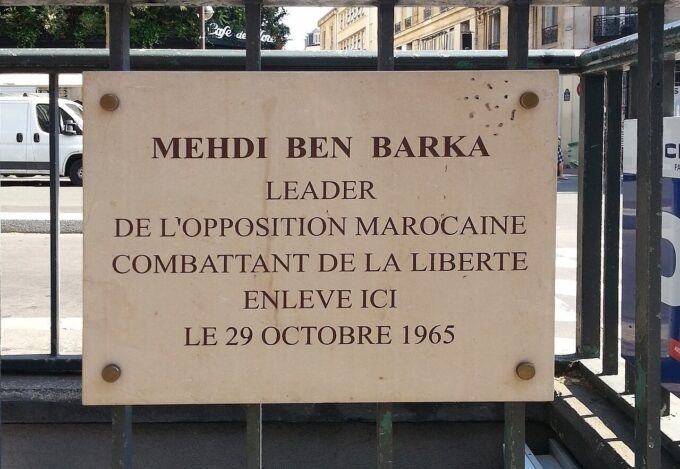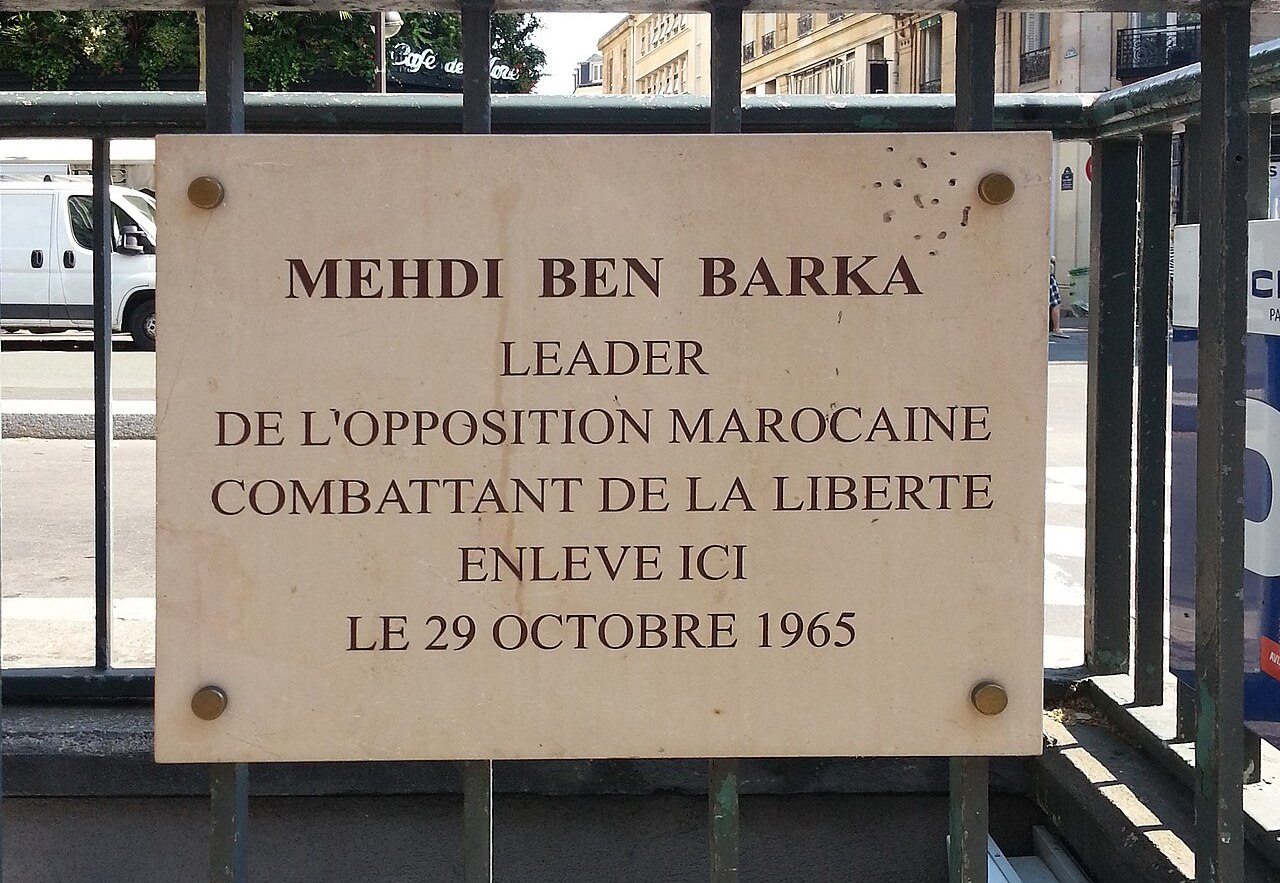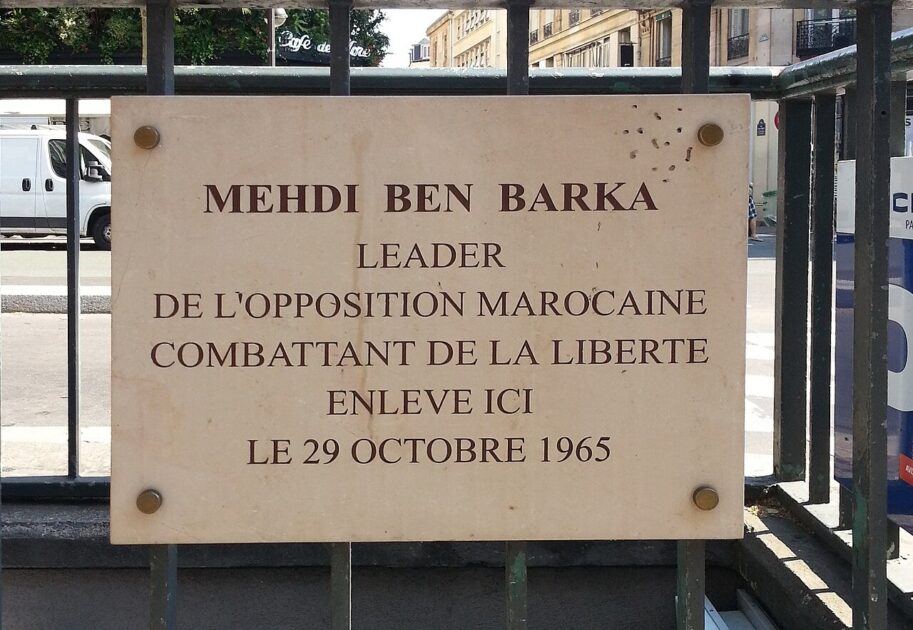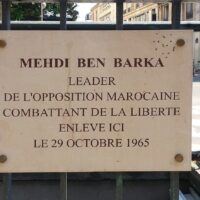


































































A commemorative plaque where Ben Barka went missing. Photograph Source: User:TCY – CC BY-SA 1.0
Vijay Prashad interviewed by Rosa Moussaoui, journalist with L’Humanité. This interview was published in French in the newspaper on 27 October. Ben Barka was assassinated on 29 October 1965, sixty years ago.
Rosa: What were the reasons behind the holding of the Conference of Solidarity of the Peoples of Asia, Africa and Latin America, the Tricontinental Conference, in Havana in 1966? Was this initiative a continuation of the Bandung Conference a decade earlier?
Vijay: The Bandung Conference was set up by the new governments in the post-colonial world. These countries included Indonesia (the host) India, and Egypt (there is more on the importance of the Bandung Conference at our Tricontinental dossier from earlier this year). The heads of government of these countries gathered and tried to chart a way out of the neo-colonial system that would keep their economies in dependent bondage and that would keep their peoples as inferior in the world system. But the movements that had not yet attained independence in their countries were not invited to Bandung, nor were they invited to the follow-up meetings in Cairo. It was this absence that provoked the Cuban Revolution to invite both heads of state and representatives of national liberation movements to Havana for the Tricontinental conference. The main issue was Vietnam, which was under a concerted attack by the imperialist forces. The Vietnamese came alongside other national liberation forces (from African regions controlled by Portugal and from Central America, where the US and its allies defined the terms of government). So, in a sense the Tricontinental was a continuation of Bandung, but also an elaboration or extension of Bandung.
Rosa: What role did Moroccan leader Mehdi Ben Barka play in this movement? What characterised his generation of revolutionaries who emerged from the decolonisation struggles?
Vijay: Mehdi Ben Barka was a crucial figure in the international revolutionary movement. The Cubans themselves could not build the conference, since – at that time – they did not have many contacts in Africa and Asia (their Revolution was only about five years old when the preparations for the conference began). Mehdi Ben Barka, from the struggle against the monarchical state in Morocco, had been in exile for many years and knew the field of political struggle very well. Fidel Castro trusted him implicitly, so Ben Barka travelled around the world incognito to help build the conference. His son – Bachir – has in his possession the diaries and notebooks that Ben Barka kept, and these show precisely what he did to build that conference. Revolutionaries such as Ben Barka recognised that their role in life was to help build both their own movements in their countries, and the international trust and fellowship between movements. Both are equally important. Without international connections a movement can get isolated, and it can make decisions based only on the local or national context, and not with an understanding of the international context. This was a lesson Ben Barka learned in his fight against the Moroccan state.
Rosa: What was the political significance and global impact of his abduction and assassination in Paris in 1965, while he was preparing for this conference?
Vijay: That Ben Barka was abducted and assassinated by the French and Moroccan authorities could not have been a surprise to him. He was hated by the Moroccan authorities, who would hate anyone who was against monarchical rule. Equally, the French and other Western intelligence agencies knew that Ben Barka was playing an important role in the anti-colonial struggle, and that the Tricontinental conference was a dangerous event for them. I would not be surprised – when we get the full information – that the Portuguese dictatorship played some role in his death since they were furious about the role of the Tricontinental in building the international connections for the armed struggle in the Portuguese colonies in Africa.
Rosa: How does the Tricontinental Institute, which you head, carry on the legacy of the decolonisation struggles, anti-imperialist struggles and the non-aligned movement today?
Vijay: In my office, I have a photograph of the last plane that Ben Barka took from Havana to Paris. It is an Air France flight. I look at it often. It gives us courage to continue the work of Ben Barka, Fidel Castro, and the Tricontinental conference. We fight against the agenda of war and austerity, on debt and impoverishment that characterises the world today. But we also fight for, not just against. We are for development, and for peace, for bridges to be built not bombed. That is the message of the Tricontinental, and it shines brightly for us. And for that we honour our ancestor, Mehdi Ben Barka.
The post Remembering Assassinated Moroccan Leader, Mahdi Ben Barka, and the Tricontental Conference appeared first on CounterPunch.org.
This post was originally published on CounterPunch.org.